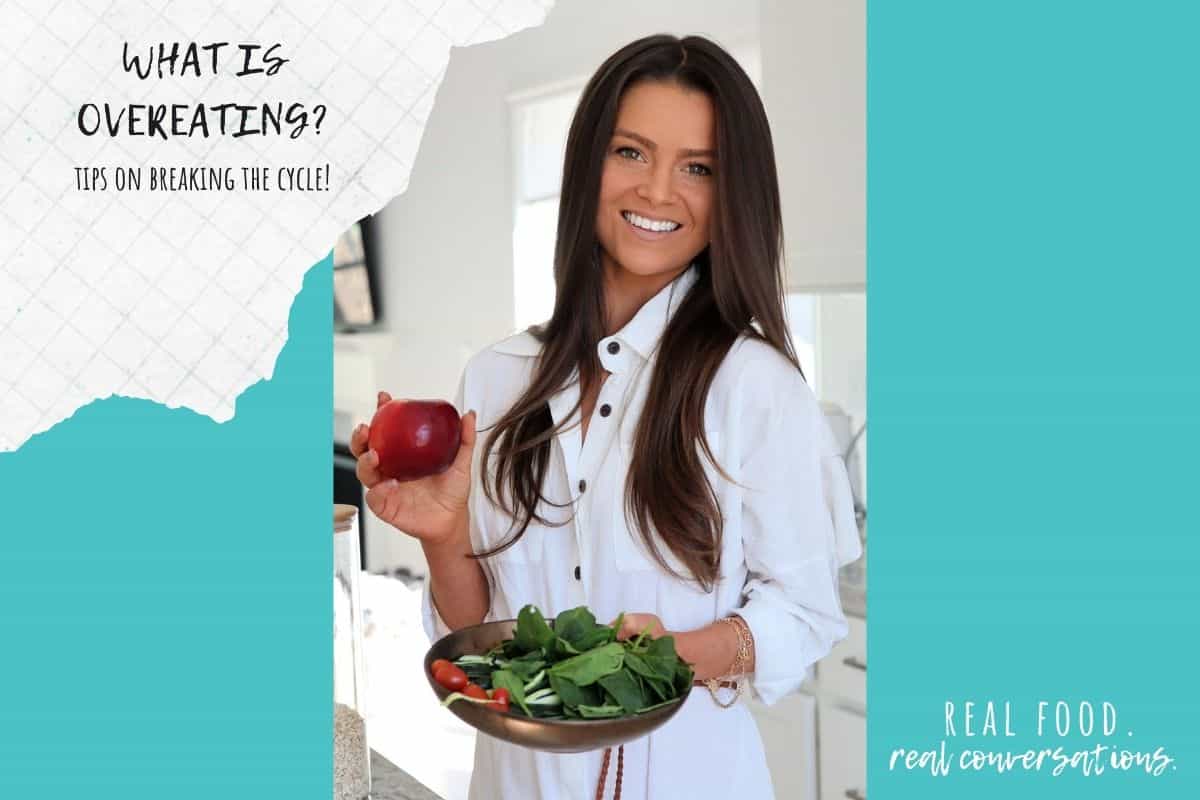When it comes to enjoying food it's important to know what overeating is versus feeling full from enjoyment. Our expert today clears it all up so we can learn to enjoy food when we want!

It's so important to know the difference in order to live a lifestyle with both our mental and physical wellness in mind.
I love food and I love eating! It's not bad to feel overly full from time to time when we are enjoying the food we eat. We need to learn to trust our body to do what it needs to do instead of punish ourselves.
Podcast: Play in new window | Download | Embed Subscribe now! Apple Podcasts | iHeartRadio | TuneIn | Deezer | RSS | More
Healthy Emmie is a plant-based nutritionist and founder of the Slim on Starch Program. She has helped thousands of people make massive changes to their lives and build a positive mindset around food and health for long-term weight loss. You can learn more at HealthyEmmie.org.
Get her FREE one day meal plan here!
Difference Between Overeating and Being Full
Being hungry or full are not mutually exclusive. The hungry and full feelings are more of a spectrum that individual feelings. On one end you have the you are so hungry you may faint feeling and on the other end you have you are bursting full.
So you can be anywhere along that spectrum throughout the day.
Overeating means that you are ignoring the signals of your body that it's had too much and you keep eating anyway. You can feel full after overeating and be extremely uncomfortable, but you can also feel amply full and not in pain.
Emotions and Overeating
There are many emotions related to food. We gather to eat with those we love through parties and celebrations and holidays. For some people, food also plays a role in comfort.
The food we eat has calories and calories give us dopamine. The more calories a food has, the more dopamine we get. This is why cookies taste better than carrots because they have more calories.
Dopamine is the motivation chemical, it's a survival mechanism. So whenever we do something that promotes our survival we release dopamine. Things like eating, sleeping, sex...these are all linked to our survival.
When we are trying to get that good feeling, it's often we turn to food, and mostly food with those high calorie levels since those have more dopamine. And the more dopamine we get, the more we self soothe.
We are all different when it comes to our emotions and food and it's important to look at the big picture to see why someone may be turning to food and why overeating is occurring.
How Many Calories Are Considered Overeating?
There isn't one set amount of calories that we use for qualifying overeating. It really all depends on each person, their own body (not just body size but how it functions) and how much they are taking in and using.
So focusing on calorie numbers isn't the best approach. If we focus less on numbers and more on feeling, we can better address the issue.
Another factor is exactly what someone is eating. This is because certain foods will help satiate you better than others. Foods with fiber, fat and protein can help you feel full longer so someone eating these may feel more full than someone eating foods without them.
Signs You Are Overeating
First and foremost, always listen to your body. The main reason behind overeating is a disagreement between what your mind is telling you and what your body is telling you. The signs are both physical and mental. Here are some things you may be experiencing:
- Sharp pain
- Overall discomfort
- Remorse and desire to undo what has just been done
- Restricting the next day
- Being caught in a cycle between overeating and extreme restriction
How to Stop Overeating
Many people think the issue is the binging, when in fact it's actually the restriction that is the main issue. So if we focus less on the overeating part and more on avoiding restriction, it can help stop the cycle better.
Here are some things you can do to stop overeating:
- Follow a drip system eating where you eat every 2-3 hours.
- Eat when you are hungry not just during traditional meal times.
- Give your brain time to tell you it is full, it takes about 20 minutes for the stomach to tell the brain it has had enough so eat slowly and give your brain time to catch up.
- Be in the moment and pay attention to your body's cues versus eating while you are distracted with technology.
- Avoid going long periods of time without food, if you feel hungry make sure to eat.
What is interesting is that in other parts of the world meal times last hours, but here in America the average breakfast is less than 5 minutes. If we take more time to practice mindfulness and being in the moment when we are eating, perhaps we can get better at reading our body's cues.

PS- If you liked this episode of Real Food Real Conversations, please subscribe and leave me a review!
And tag me on Instagram whenever you're listening! I reply to all my messages!














Questions or comments? Let me know below!